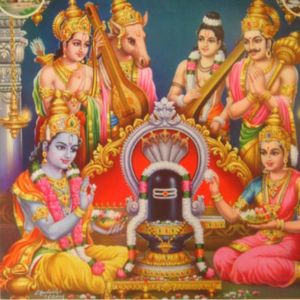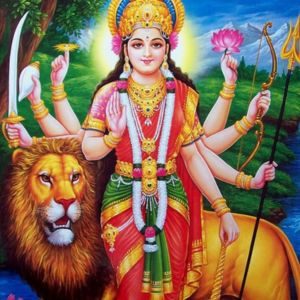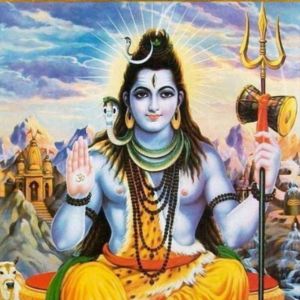Vibhishana in Ramayana - A Tale of Morality, Loyalty, and Redemption

Vibhishana, the formidable younger brother of Ravana, plays a significant role in the epic Ramayana. This blog post explores the multifaceted character of Vibhishana, emphasizing his moral and ethical dimensions in contrast to his brother Ravana. From his background and relationships to pivotal moments in the narrative, we delve into Vibhishana's journey from a rakshasa to a revered king.
Vibhishana's Background and Family:
Vibhishana was born as the youngest son of the rakshasi Kaikesi and the sage Vishrava, making him the brother of the mighty Ravana and Kumbhakarna. Despite his rakshasa lineage, Vibhishana considered himself a Brahmin due to his father's sagehood. This distinction marked the beginning of his differences with Ravana.
Defection from Ravana:
Vibhishana's moral compass led him to oppose Ravana's actions, particularly the kidnapping of Sita. Fleeing Lanka, he sought refuge with Sri Ramji, who was assembling an army to defeat Ravana and rescue his wife. Vibhishana's decision to divulge Ravana's secrets ensured Sri Ramji's victory in the great battle.
Coronation as the King of Lanka:
After Sri Ramji's triumph over Ravana, Vibhishana was crowned as the King of Lanka. In some versions of the epic, he takes Ravana's queen Mandodari as his second wife, while in others, he seeks her blessings during his coronation.
Role in the Lanka War:
Vibhishana's intimate knowledge of Lanka's secrets proved invaluable to Sri Ramji during the war. He disclosed crucial information, including the secret path to the temple of Nikumbala, aiding Sri Ramji's strategic moves. In the climactic battle, Vibhishana revealed the key to Ravana's invulnerability, enabling Sri Ramji to emerge victorious.
Post-War Responsibilities and Immortality:
Upon Sri Ramji's departure from Ayodhya, he instructed Vibhishana to stay on earth, serve the people, and guide them in the path of truth and dharma. Vibhishana, thus, became one of the Chiranjivis, the eight immortals, and was tasked with praying to the family deity of the Solar dynasty, Ranganatha.
Vibhishana's Character and Dharma:
The Ramayana highlights Vibhishana's character as a means to illustrate the practical implications of the concept of dharma. It emphasizes that moral dilemmas can be approached in different ways, showcasing Vibhishana's choice to oppose his kin when advice failed, in contrast to Kumbhakarna's loyalty to kin despite failed advice.
Regional Legends:
Vibhishana's significance extends to regional legends, such as his association with the Ranganathaswamy temple in Srirangam. Here, he plays a crucial role in the consecration of the Sri Ranga vimana, showcasing his enduring connection with Vishnu.
Conclusion:
Vibhishana's journey in the Ramayana is a tale of redemption, morality, and loyalty. From defying his rakshasa lineage to becoming a revered king, Vibhishana's character resonates with timeless lessons. As we delve into the epic, we witness the transformative power of dharma and the enduring legacy of a character who chose the path of righteousness.
Why did Vibhishana defect from Ravana to join Rama in the Ramayana?
Vibhishana's opposition to Ravana's actions, particularly the kidnapping of Sita, and his commitment to dharma led him to defect and ally with Rama in the pursuit of righteousness.
How did Vibhishana's knowledge contribute to Rama's victory in the Lanka War?
Vibhishana's intimate knowledge of Lanka's secrets, including the secret path to Nikumbala's temple, played a crucial role in Rama's strategic moves, contributing significantly to his triumph over Ravana.
Quiz
What pivotal role did Vibhishana play in the Ramayana's Lanka War?Recommended for you
Avudai Akkal: A Woman's Journey to Spiritual Enlightenment

Discover the story of Avudai Akkal, a woman born in the sixteenth century whose intense spiritual experience led her to become a revered saint. Learn ....
Click here to know more..Durga Suktam

ॐ जा॒तवे॑दसे सुनवाम॒ सोम॑ मरातीय॒तो निद॑हाति॒ वेदः॑ । स ....
Click here to know more..Shiva Namavali

om shreekant'haaya namah'. om anantaaya namah'. om sookshmaaya namah'. om trimoortaye namah'.....
Click here to know more..
English Topics
Rare Topics
Click on any topic to open
- 237 The Practice of Bhojana Sadhana
- 236 Words of Wisdom - 2
- 235 Defining Goodness - Sanatana Dharma's Perspective
- 234 Vibhishana in Ramayana - A Tale of Morality, Loyalty, and Redemption
- 233 God will not let you break
- 232 A Glimpse into the 64 Arts
- 231 Chembai Vaidyanatha Bhagavatar - A Carnatic Maestro's Musical Odyssey
- 230 Understanding Adhyāsa: A Closer Look at False Attribution
- 229 Is Family's Permission Necessary For Becoming Sanyasi ?
- 228 Faith In Upasana
Please wait while the audio list loads..
30
Ganapathy
Shiva
Hanuman
Devi
Vishnu Sahasranama
Mahabharatam
Practical Wisdom
Yoga Vasishta
Vedas
Rituals
Rare Topics
Devi Mahatmyam
Glory of Venkatesha
Shani Mahatmya
Story of Sri Yantra
Rudram Explained
Atharva Sheersha
Sri Suktam
Kathopanishad
Ramayana
Mystique
Mantra Shastra
Bharat Matha
Bhagavatam
Astrology
Temples
Spiritual books
Purana Stories
Festivals
Sages and Saints
